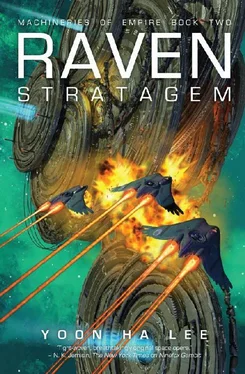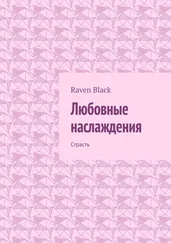He had thought there might be a reaction this time, but still nothing. “Is it a weapon?” Jedao said. “A sculpture? A really terrible snack food?”
“Never mind, then,” Mikodez said. “I just thought you might be able to tell me about it.”
“I failed the test, didn’t I,” Jedao said ruefully. “In my defense, it’s hard to read up on things when there’s no light.”
“It genuinely isn’t important,” Mikodez said. It looked like Cheris was dead, or unavailable, or whatever happened to possessed people. Besides, it wasn’t as if Jedao, or Cheris for that matter, could do anything useful about the planned genocide. Mikodez himself certainly didn’t need Jedao’s permission to do as he pleased about the situation. “Try not to kill more people than necessary.”
“I’ll keep that in mind,” Jedao said. “Goodbye, Shuos-zho.” His image flicked out and left the Deuce of Gears in its place, gold on a field of livid red. Then that, too, vanished.
“That could have gone better,” Mikodez said to his green onion. But he hadn’t hoped to fix four centuries of mismanagement in one conversation. It would have to do for a start.

CHAPTER TEN
KHIRUEV HAD GOTTEN accustomed to the fact that Jedao was, as commanding officers went, conscientious about details. She couldn’t imagine that someone with Jedao’s battle record had achieved what he had by dashing around without paying attention to logistics. And logistics were going to be an issue since they were renegades. So far their supplies had held up, but who knew how long a campaign Jedao had planned?
Jedao was also conscientious about getting to know his staff as individuals, and holding regular conferences with the leaders of the tactical groups and the scoutmoths, and even walking through the Hierarchy of Feasts’ levels and chatting with the crew. No one would ever forget who Jedao was or what he had done, and no one would ever feel at ease around him, despite his pleasantness. But then, this was a very old game to Jedao.
Sixteen days after the engagement at Spinshot Coins, as the swarm continued its pursuit of the Hafn, Jedao and Khiruev had returned from one such walk and ended at Khiruev’s quarters, which was odd. The walk itself had been nothing remarkable. Indeed, it wasn’t unusual for a swarm’s general to inspect their command moth with the high officers aboard. Khiruev remembered such walks as a brigadier general under Lieutenant General Myoga, who, while excellent at training large swarms, had possessed an unfortunate soft, droning voice that resisted everyone’s augments’ attempts to decipher it when she inevitably trailed off at the end of a sentence. This didn’t matter when you were composited and the pickups transmitted everything from subvocals, but it became embarrassing when you were fumbling for a response to whatever she had just said while poking around the engine room. At least Jedao spoke loudly enough to be heard, and his drawl, while unusual, was paradoxically comprehensible.
Jedao’s divide-and-conquer tactics, which involved talking to individuals rather than groups whenever this made sense, were transparent. Yet no one could do anything about it. Khiruev made a point of reminding herself every time she woke up that the swarm had been stolen from her, not as a matter of personal pride (although, if she was honest with herself, there was an element of that too). It didn’t make a damn bit of difference. Jedao might be a manipulative bastard, but he was the manipulative bastard that Khiruev was bound to serve.
So it came as no especial surprise when, having gotten Khiruev alone, Jedao asked her a personal question. It didn’t matter that Khiruev’s own quarters should have been friendly terrain. Ever since that scathing critique of her assassination attempt, Khiruev would always be slicingly aware of Jedao’s dominance whenever they met here.
Khiruev was shuffling a deck of jeng-zai cards, not because they were going to play (she hoped; Jedao was unnaturally good), but because it gave her hands something to do. One servitor, a scuffed lizardform, was making the usual doomed attempt to clear debris from under Khiruev’s workbench. Another, a deltaform, had accompanied them during the walk and into the sitting room. Perhaps it thought Jedao might call for refreshments.
Jedao wasn’t looking directly at Khiruev when he said, “General, how do you feel about children?”
Any question of Jedao’s was bound to have teeth hidden in it, but this one baffled Khiruev. “I haven’t got any, if that’s what you mean,” she said, setting the cards down and squaring them neatly. Surely Jedao could have looked that up?
“Let me rephrase that,” Jedao said. “You don’t have any children in the Tieneved—excuse me, in the legal, high-language sense. But did you ever become a mother?”
It took Khiruev a while to work out what Jedao was getting at. Jedao was Shparoi, from a culture that no longer existed in the hexarchate. Khiruev was accustomed to people entering marriage contracts for mutually agreeable periods of time to form a shared household or, if children would be involved, a lineage. Said contracts laid out whether those children would be natural-born or crèche-born. (Outdated terminology: most people were crèche-born, and had been for some time. The language had not caught up to contemporary practice.)
Jedao was asking about being a non-custodial parent, a paradox in the high language. Children might be adopted, or might be formed from some combination of genetic material from the household’s parents, or from a donor or donors if that was desirable. But the marriage contract would spell out clearly who had birth-custody of the children, and only that person or persons were the parents. Apparently, Jedao was conflating being a genetic contributor and being a parent, even if the donor was not part of the contracted household.
“Sir,” Khiruev said, wishing she hadn’t been put in the position of deciphering Jedao’s real question, “did you have genetic spawn?” Horrible circumlocution. The high language term she’d used referred to animals. It was offensive to use it to refer to humans. But in the absence of an adequate word, she had to get the idea across somehow. Khiruev did speak two low languages, but both came from the same language family as the high language and suffered the same deficiency of lexicon.
To her relief, Jedao snorted. “No, that wouldn’t have happened,” he said. “I saw to that medically and I didn’t sleep with many womanforms to begin with. But I’ve always wondered if other”—he used a word Khiruev didn’t recognize, sibilants and an oddly pinched vowel. Shparoi, presumably. “If I had other siblings. Ones that survived.”
Jedao’s hand dangled over the arm of the chair. He gazed at a world folded up into myth and mystery and footnotes no one read anymore but historians with high security clearances. “Once in a while, when Kel Command took me out of my pickle jar, I’d ask one of my anchors and they’d know about my mother, my sister, my brother and his family.” Assassinated; vanished; murder-suicide on Hellspin’s anniversary. “But no one had heard anything about any other siblings.
“I had a father, in the Shparoi sense,” Jedao resumed after a long pause, “but not in the hexarchate one. He died before Hellspin, flitter accident. We’d met only twice years before that. He was a violist, very handsome. My mother was forever complaining that she’d gone to the trouble of picking a particularly nice one and I didn’t have the decency to inherit either his musicality or his looks.” The note of affection when Jedao mentioned his mother sounded disquietingly genuine. “Anyway, I never asked him if he’d sired others, in arrangements like the one he’d had with my mother. I didn’t investigate, either. It would have been extremely improper. Now he’s over four centuries dead and I’ll never know if anyone in my lineage survived.”
Читать дальше













